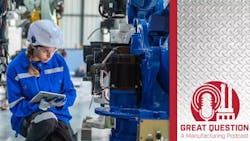Podcast: Is It a Good Idea or a Potential Headache to Have Operators Pitch in on Maintenance Tasks?
Joe Kuhn, CMRP, has worn a lot of hats in his career—plant manager, engineer, and global reliability consultant. These days, he's running the show at Lean Driven Reliability LLC. Joe's put his know-how into a book called "Zero to Hero: How to Jumpstart Your Reliability Journey Given Today's Business Challenges" and he's got a YouTube channel where he dishes out tips on getting your reliability game up to speed and reaching financial freedom. In our monthly podcast chat, Ask a Plant Manager, Joe tackles real-world problems that pop up in the industry. He shares his two cents and some practical steps you can take to get things rolling tomorrow. This time around, we're diving into whether it's a good idea or a potential headache to have operators pitch in with maintenance tasks.
Below is an excerpt from the transcript:
PS: So back in February, we had a discussion, which you said up front, might be perceived that as one of these controversial topics or one where there might be some disagreement. And we talked about who owns reliability. Is it maintenance or is it operations? You very clearly supported that operations owns reliability. If you didn't catch that episode, you should go back and listen. But Joe, your main reasoning, and I've simplified somewhat here, was that maintenance becomes the advisors, and operators are the deciders. Maintenance explains the consequences and the risk of the work, and operators make those decisions. And another good point that I think you made from that episode was that if everyone owns reliability, nobody does so, so somebody needs to own it.
So if operators own reliability, and maintenance does work on equipment and advises operators on risk versus reward, how do you feel about operators doing maintenance? You like to use the metaphor of your car and a mechanic. So who owns the reliability of your car? You do, of course. A mechanic can do maintenance on it for you and can advise you on what you should or shouldn't do, so that makes sense. But I'll tell you, Joe, my husband is a carpenter. He's very handy. He is not a car mechanic, but has worked on most of our cars, and he has saved us a lot of money. Mechanics are very expensive, very much like shutting down operations for maintenance work, or pulling technicians off something else to help tend to an emergency. So does the same metaphor apply here? Can operators who operate that equipment, sometimes for many years, and are the ones who make the ultimate decisions about reliability for that machine, can they also learn to do maintenance activities on equipment? Okay, good or bad? Joe, go.
JK: Yes, it can be a great thing, but I will put a massive asterisk by that—massive. Okay, so I don't want anybody saying, ‘Hey, this is all good, okay?’ Because I've lost. I've made some decisions with operators doing maintenance that has cost me millions of dollars, millions. Okay, one event was over a million dollars, and I'll go into that a little bit.
It's very popular, instance for, to say ‘hey, I've got this trained mechanic. I'm going to have him do some complex things, complicated things, precision work. And let's have the operators change the oil, change the filter, just simple tasks, maybe three or four steps that they can do during the course of their day, while the equipment's running, while they're during doing setup, something like that.’ Very popular. It's like you got a free resource there. A free resource. While the machine is being maintained by mechanics over on the left side of the piece of equipment, you could do some simple PMs on the right side.
But here's the problem, and I'll make this really simple. When mechanics come into work today, and they're given three PMs, that first PM is their number one priority for the day. The second comes when the first one's completed. Then, they go to the second one, then the third one. It's their top priority. At the end of the day, they get those three PMs done. That's a good day. Those are their priorities. Here's the problem. An operator comes in, and his priority is to work safely, operate the machine to make quality product, keep the housekeeping all cleaned up, make the right product in the right order. And if you have time, do the PM. That is a problem because if one thing gets skipped that day, guess what it is? It's the lubrication of the machine. It's the changing of the filter, and that is a huge issue. It is not their number one priority of the day, and it slips. There's something called drift, where you train 10 people to do a job. ‘Hey, do this every day.’ A week later, eight of them are doing it. Two weeks later, five of them are doing it. It can be a massive problem.
About the Podcast
Great Question: A Manufacturing Podcast offers news and information for the people who make, store and move things and those who manage and maintain the facilities where that work gets done. Manufacturers from chemical producers to automakers to machine shops can listen for critical insights into the technologies, economic conditions and best practices that can influence how to best run facilities to reach operational excellence.
Listen to another episode and subscribe on your favorite podcast app
About the Author
Anna Townshend
Managing Editor of Control Design and Plant Services – Endeavor Business Media
Anna Townshend has been in B2B magazine publishing for more than a decade. She took her love for business journalism to a new industry in June 2020, where she is the managing editor of Control Design and Plant Services, published by Endeavor Business Media.
Plant Services helps plant operations make the most of smart manufacturing processes and asset management.
Control Design serves industrial machine builders and the OEM market for industrial controls.

